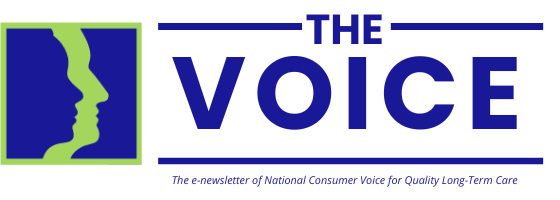|
September 27, 2022
In this Issue:
- Additional Medicare Nursing Home Ownership Data Publicly Available
- GAO Report Details Infection Control Failures During Pandemic and Makes Recommendations for Reform
- New CMS/CDC Guidance Ends Some Indoor Masking Requirements in Nursing Homes
- Materials Available from TA Talk on NORS; Additional Q&A on October 13th
- Materials Available from NORC Webinar on Ombudsman Program and Adult Protective Services Collaboration
|
|
Additional Medicare Nursing Home Ownership Data Publicly Available
The U.S. Department of Health and Human Services (HHS), through the Centers for Medicare & Medicaid Services (CMS), has made additional data publicly available on the ownership of all Medicare-certified nursing homes. For the first time, state licensing officials, state and federal law enforcement, researchers, advocates and the public will be able to identify common owners of nursing homes across nursing home locations. This information can be used with other data sources to assess the performance of facilities under common ownership, such as owners affiliated with multiple nursing homes with a record of poor performance. The release of the data is in support of the Biden-Harris Administration's effort to improve nursing home transparency.
Learn more in the press release from CMS.
|
|
GAO Report Details Infection Control Failures During Pandemic and Makes Recommendations for Reform
On September 14, 2022, the U.S. Government Accountability Office (GAO) released a report detailing the catastrophic failure of nursing homes to protect residents from COVID-19. The report focused on infection control practices and how years of poor practices, by nursing homes and government agencies, in the years preceding the pandemic resulted in the devastating impact on nursing home residents.
Importantly, the GAO report addressed not only the harm caused by the COVID-19 virus itself, but how many residents suffered as a result of policies implemented by the federal government and nursing homes, including bans on visitation and allowing nursing homes to use untrained nursing staff.
The report made several findings and recommendations to the Center for Medicare & Medicaid Services (CMS) to help protect residents from infections in the future.
What the Report Found:
- CMS’s current infection control preventionist (ICP) standards are too vague.
- CMS is not collecting staffing data on infection control preventionists.
- CMS’s ICP guidance to state survey agencies is inadequate.
- 2020 data from nursing homes showed a worsening in seven of eight key indicators of nursing home resident mental and physical health.
- Stakeholders reported bans on visitation during the first year of the pandemic contributed to declines in resident health.
- Only 1% of infection control violations were classified at the highest severity in 2018 and 2019.
- CMS’s policy of allowing untrained workers to provide care in nursing homes contributed to poor infection control practices.
Consumer Voice recommends that CMS:
- Require all infection preventionists to be an RN, advanced RN, or physician.
- Establish clear national training standards that all infection preventionists must meet.
- Increase penalties for infection control deficiencies.
Read our full summary and analysis of the report.
|
|
New CDC/CMS Guidance Ends Some Indoor Masking Requirements in Long-Term Care Facilities
The Centers for Disease Control and Prevention (CDC) and the Centers for Medicare & Medicaid Services (CMS) have released updated guidance regarding masking in long-term care facilities. Under the new guidance, nursing homes in counties where COVID-19 community transmission is not high can choose not to require visitors to wear face coverings or masks while in the facility, except during an outbreak. The guidance states that in nursing homes in counties where COVID-19 community transmission is high, "everyone in a healthare setting should wear face coverings or masks." In its guidance, the CDC notes that "updates were made to reflect the high levels of vaccine-and infection-induced immunity and the availability of effective treatments and prevention tools."
See the CMS and CDC guidance.
|
|
Materials Available from TA Talk on NORS; Additional Q&A on October 13th
The recording and materials are available from last week's Technical Assistance (TA) Talk on the National Ombudsman Reporting System (NORS) from the National Long-Term Care Ombudsman Resource Center (NORC). NORC provides daily in-depth technical assistance, consultation, information, and referral for Ombudsman programs. To increase direct access to technical assistance (TA) and peer support, NORC hosts quarterly live technical assistance dialogues. Beverley Laubert, National Ombudsman Program Coordinator, Administration for Community Living, discussed the importance of NORS data.
Were you unable to join the NORS TA Talk? Attend an additional NORS Q&A with NORC and Beverley Laubert on Thursday, October 13th at 3:00pm ET to address any additional questions regarding NORS. Be sure to watch the recording of the previous TA Talk before tuning in to see if some of your questions were already answered.
Register for the NORS Q&A.
|
|
Materials Available from NORC Webinar on Ombudsman Program and Adult Protective Services Collaboration
The recording and materials are available from the National Long-Term Care Ombudsman Resource Center (NORC)'s recent webinar, "We Have Unique Roles, But Often Support the Same Consumer: Long-Term Care Ombudsman Program and Adult Protective Services Collaboration." The webinar provided information on how how Long-Term Care Ombudsman programs (LTCOP) and Adult Protective Services (APS) can work together to better serve people living in long-term care facilities. Programs from three states shared how their collaboration enhanced staff and community partners' knowledge about each program, provided training regarding sexual abuse and exploitation of long-term care residents, and assisted individuals involuntarily discharged from facilities.
View the webinar materials.
|
|
Reminder: Regular Registration for the In-Person Consumer Voice Conference Ends October 14th
|

|
